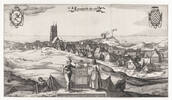A Wind of Change on Java’s Ruined Temples: Archaeological Activities, Imperial Circuits and Heritage Awareness in Java and the Netherlands (1800-1850)
DOI:
https://doi.org/10.18352/bmgn-lchr.8356Keywords:
Imperial HistoryAbstract
This article focuses on early archaeological activities on Java between 1800 and 1850 in the context of the multiple regime changes of that period. It engages with the New Imperial History’s network-centred approach by looking at circuits of archaeological knowledge gathering in which not empire, but Java’s ruined Hindu and Buddhist temple sites provide ‘the nodal points’. By tracing how people, objects and ideas travelled via these sites, and between the Netherlands and the colony, the article aims to understand the origins and nature of heritage awareness of the modern colonial state.
It argues that this archaeological site-centred approach helps us understand how both European concepts and indigenous appropriations of archaeological sites contributed to the development of heritage awareness. There were complex multilayered power-hierarchies at work at these sites and forms of indigenous agency that we might miss if we follow only empire-centred networks.
This article is part of the special issue 'A New Dutch Imperial History'.
Downloads
Downloads
Published
How to Cite
Issue
Section
License
Authors who publish with this journal agree to the following terms:
a) Authors retain copyright and grant the journal right of first publication with the work simultaneously licensed under a Creative Commons Attribution 4.0 International (CC BY 4.0) that allows others to share the work with an acknowledgement of the work's authorship and initial publication in this journal.
b) Authors are able to enter into separate, additional contractual arrangements for the non-exclusive distribution of the journal's published version of the work (e.g., post it to an institutional repository or publish it in a book), with an acknowledgement of its initial publication in this journal.
c) Authors are permitted to post their work online (e.g., in institutional repositories or on their website) prior to and during the submission process.
Authors are explicitly encouraged to deposit their published article in their institutional repository.











